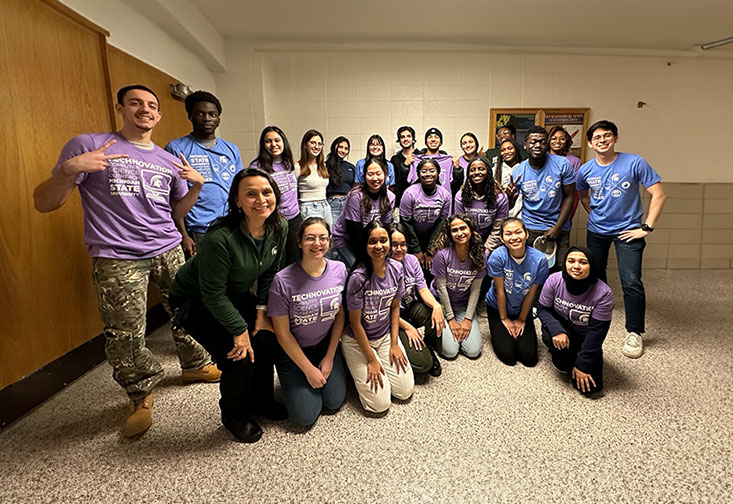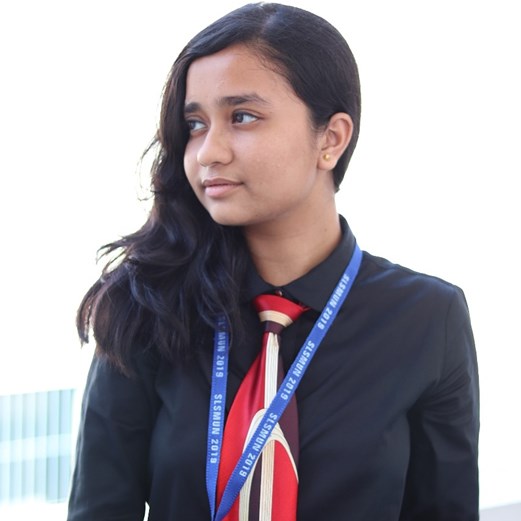Coding for all is a goal of Spartan Engineers at Michigan State University.
For the past 15 years, MSU has hosted a computer science community outreach program, one of them is called the Technovation Coding Club. Technovation is a student-led effort that introduces 6-12th grade students to computer science using games, mini-projects, and team-building activities.

“We had an excellent fall semester teaching the computer programming language Python to students. We taught virtually around Michigan and internationally, as well as in-person at Lansing’s Foster Community Center,” said Teresa VanderSloot, director of Broadening Participation K-12 in the MSU College of Engineering.
Around 70 youth participated in the most recent session, including 30 in-person and 40 virtual students. College student mentors have helped in the club’s outreach in Belize, Ghana, and Turkey as well.
“Over the years we’ve become much more robust,” VanderSloot said. “In 2018, we began working with Lansing’s Capitol District Library to reach out to underrepresented groups. We’ve had to learn to be a well-oiled machine because we have between 20 and 35 college students acting as mentors to youth at different skill levels. The mentors take their roles seriously and appreciate it is a part-time, paid job.”
VanderSloot said she enjoys watching the student mentors become teachers and leaders.
“The programming languages change throughout the year. The mentors teach Python in the fall, using turtle graphics, and then more web-based programs in the spring in partnership with Girls Who Code. We have used the library’s space downtown or at the Foster Community Center for nine Saturdays from around 10 a.m. to noon, with a debrief at 12:30 p.m. We have also held classes in the Engineering building.
VanderSloot said pre- and post- surveys as well as weekly “temperature checks” help to continually collect feedback from participants. The program benefits from the support of College of Engineering faculty members and teaching specialists, including Laura Dillon and Josh Nahum who serve as faculty advisers. Others include Ritam Ganguly, Emily Dolson and Panagiotis Traganitis along with graduate students Oyendrila Dube and Julia Zheng.
Meet Technovation’s student leaders

Sanaye Lewis serves as the overall administrator for Technovation. A junior at MSU from Kennesaw, Georgia, she is a member of the Honors College and a computer science major. Her career goal is to become a software engineer.
“Learning how to explain computer science concepts in a simple way helps you understand the fundamentals better,” Lewis said. “Being an underrepresented student myself, I feel passionate about getting students excited about coding, especially those who may be lacking resources.”
Lewis said dealing with challenges like retention and virtual problems are key to not losing participants.
“Teresa (VanderSloot) always has a lot of ideas, so I’m hoping we can continue to expand and reach our target audience. Our mentors are passionate and have their own specific reasons for participating.
“For me, seeing the final projects is the best part of the program,” she added.

Sania Sinha is Technovation’s curriculum administrator. A junior in computer science and math from Kolkata, India, she is a member of the Honors College. Her career goal is to become a research professor in artificial intelligence and machine learning.
Sinha reviews all curriculum plans, including what computer language to teach, the clarity of teaching slides, and the pace of coursework each week.
Everyone has their own interests, she noted. “Some like the social aspects, some are happy focusing on the coding. There is a strength in variety. Having a passion for what you’re doing is key.”
Sinha said Technovation’s young students are “super passionate and curious. They’ll work ahead and solve problems on their own. I built a whole website during break for those who want to work ahead.”
“Technovation is more than an extracurricular - it’s a community,” she said. “Our approach is that coding should be fun, and we work to make it so.”
Written by Patricia Mroczek.
MSU College of Engineering Media and Public Relations page